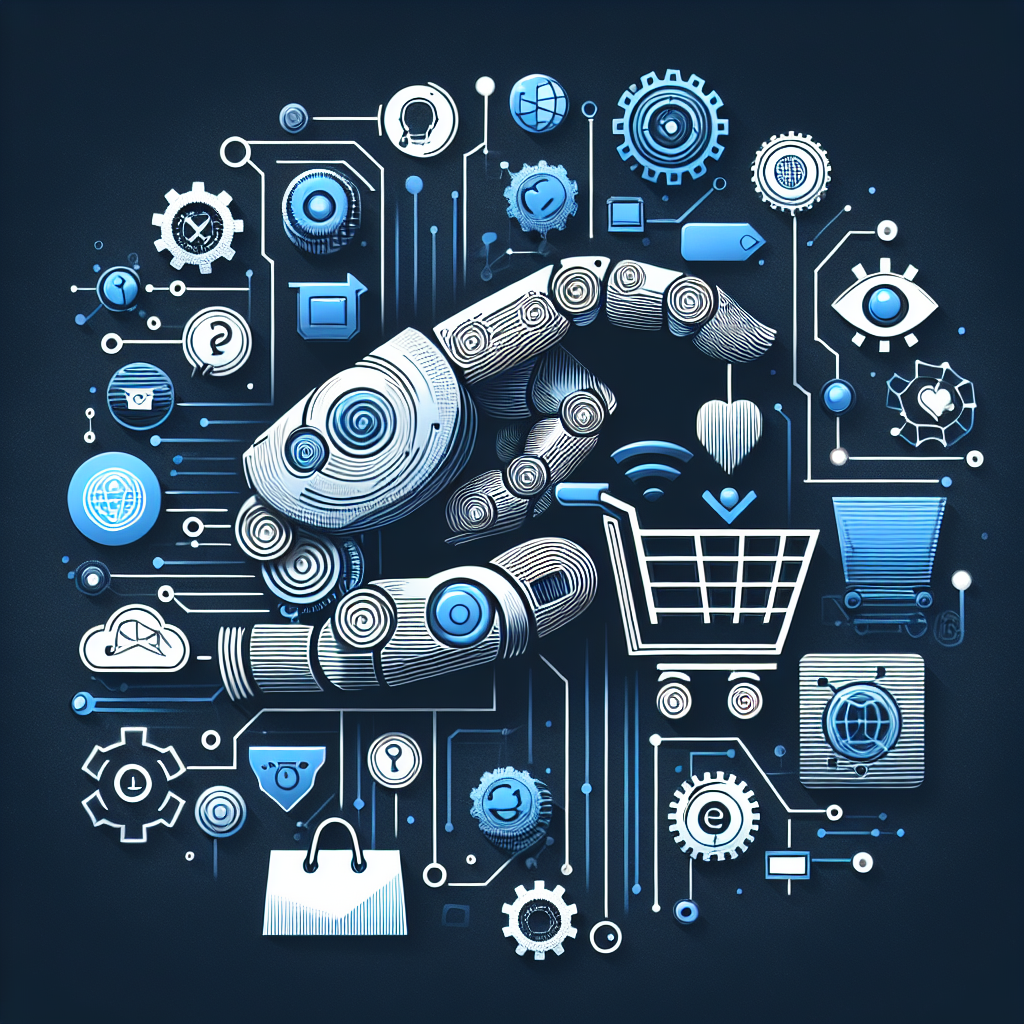Marketing automation for E-commerce
Are you an e-commerce business owner looking to maximize your marketing efforts? Look no further, because marketing automation is here to revolutionize your strategies. With the fast-paced world of online shopping, it can be overwhelming to keep up with trends and reach your target audience effectively. However, marketing automation provides a solution by streamlining your marketing tasks and allowing you to focus on what truly matters: growing your business. From search engine optimization to email marketing and influencer collaborations, this article will explore various aspects of marketing automation specifically tailored for e-commerce businesses. Get ready to take your marketing game to the next level and achieve your business goals effortlessly.
Marketing Automation for E-commerce
Marketing automation has become an essential tool for businesses in the E-commerce industry. It allows you to streamline and automate various marketing processes, enabling you to reach your target audience more efficiently and effectively. In this article, we will explore what marketing automation is, the benefits it brings to E-commerce businesses, key features to look for in a marketing automation platform, how to implement it in your E-commerce business, successful case studies, measuring its effectiveness, tips for using it effectively, common challenges, and future trends in marketing automation.
What is Marketing Automation?
Marketing automation refers to the use of technology and software to automate marketing tasks and processes, allowing businesses to streamline their marketing efforts and improve efficiency. It involves the use of software platforms that enable businesses to automate repetitive tasks, such as sending out emails, managing social media campaigns, and tracking customer interactions.
By automating these processes, businesses can save time and resources, while also delivering personalized and targeted marketing messages to their customers. Marketing automation allows businesses to nurture leads, engage with customers at various stages of the buyer’s journey, and ultimately drive sales and revenue.
Benefits of Marketing Automation
Implementing marketing automation in your E-commerce business can bring numerous benefits. Here are some key advantages:
- Time Savings: Marketing automation automates repetitive and time-consuming tasks, freeing up valuable time for you and your team to focus on other important aspects of your business.
- Improved Efficiency: With marketing automation, you can streamline your marketing processes, ensuring that tasks are executed consistently and in a timely manner. This leads to improved efficiency and saves you from the errors and delays that may occur with manual execution.
- Personalization: Marketing automation enables you to deliver personalized messages to your customers based on their behavior, preferences, and stage in the funnel. This helps to create a more engaging and customized experience for your customers, increasing their satisfaction and loyalty.
- Lead Nurturing: By automating lead nurturing processes, you can effectively move leads through the sales funnel. Marketing automation allows you to deliver targeted content and offers to your leads, helping to nurture them into paying customers.
- Increased Sales and Revenue: With personalized and targeted marketing messages, you can increase customer engagement and drive more conversions. This ultimately leads to increased sales and revenue for your E-commerce business.

Key Features of Marketing Automation
When choosing a marketing automation platform for your E-commerce business, it is important to consider the key features that will best meet your needs. Here are some essential features to look for:
- Email Automation: A robust email automation feature allows you to send out targeted emails to your customers at various stages of the buyer’s journey. This helps in nurturing leads and driving conversions.
- Segmentation: The ability to segment your audience based on various criteria, such as demographics, behavior, and preferences, is crucial for delivering personalized marketing messages.
- Lead Scoring: Lead scoring allows you to assign scores to your leads based on their behavior and engagement. This helps you identify highly qualified leads and prioritize your marketing efforts accordingly.
- Social Media Management: A marketing automation platform should have built-in social media management capabilities, allowing you to schedule posts, monitor engagement, and track the performance of your social media campaigns.
- Analytics and Reporting: Robust analytics and reporting features are essential for measuring the success of your marketing automation campaigns. Look for a platform that provides detailed insights into customer engagement, conversions, and revenue generated.
Choosing the Right Marketing Automation Platform
Selecting the right marketing automation platform for your E-commerce business is crucial for its success. Here are some factors to consider:
- Scalability: Choose a platform that can accommodate your business’s growth and scale with your needs. Consider the number of contacts, emails, and campaigns the platform can handle.
- Integration: Ensure that the marketing automation platform integrates seamlessly with your existing systems, such as your E-commerce platform, CRM software, and other marketing tools.
- Usability: Look for a user-friendly platform that requires minimal technical knowledge to operate. A simple and intuitive interface will enable you and your team to get up and running quickly.
- Support and Training: Consider the level of support and training offered by the platform provider. A comprehensive support system and training resources can help you maximize the value of the platform and troubleshoot any issues that may arise.
- Cost: Evaluate the pricing model of the marketing automation platform and consider your budget. Be mindful of any additional costs, such as implementation fees and add-on features.
By carefully considering these factors, you can choose a marketing automation platform that aligns with your business goals and enables you to achieve the desired results.

Implementing Marketing Automation for E-commerce
Implementing marketing automation in your E-commerce business requires careful planning and execution. Here are some steps to follow:
- Define Goals and Objectives: Clearly define your goals and objectives for implementing marketing automation. Identify the specific marketing tasks and processes that you want to automate, as well as the desired outcomes.
- Map Out Customer Journey: Understand your customer’s journey and identify the touchpoints where you want to engage with them. Map out the various stages of the buyer’s journey and the corresponding marketing messages and actions.
- Segment Your Audience: Segment your audience based on relevant criteria, such as demographics, behavior, and preferences. This will allow you to deliver personalized and targeted marketing messages.
- Create Engaging Content: Develop engaging content that resonates with your target audience at each stage of the buyer’s journey. This includes blog posts, social media updates, emails, and other types of content.
- Set Up Workflows: Set up automated workflows that trigger specific actions based on customer behavior. For example, when a customer abandons their shopping cart, an automated email can be sent to remind them to complete their purchase.
- Integrate Systems: Integrate your marketing automation platform with your E-commerce platform, CRM software, and other relevant systems. This ensures a seamless flow of data and allows for more targeted and personalized marketing efforts.
- Test and Optimize: Continuously test and optimize your marketing automation campaigns. Analyze the results, identify areas for improvement, and make necessary adjustments to maximize their effectiveness.
By following these steps, you can implement marketing automation successfully in your E-commerce business and reap the benefits it brings.
Measuring the Effectiveness of Marketing Automation
Measuring the effectiveness of your marketing automation campaigns is crucial for ongoing improvement and optimization. Here are some key metrics to consider:
- Conversion Rate: Measure the percentage of leads that convert into customers. This metric indicates how effective your marketing automation is in driving conversions.
- Customer Acquisition Cost: Calculate the cost of acquiring a new customer through your marketing automation efforts. This helps you understand the return on investment and the cost-effectiveness of your campaigns.
- Customer Lifetime Value: Analyze the lifetime value of customers acquired through your marketing automation efforts. This metric helps you understand the long-term profitability of your campaigns.
- Email Engagement: Monitor the open and click-through rates of your automated emails. This indicates how engaging and effective your email marketing efforts are.
- Lead Nurturing Efficiency: Measure the time it takes for leads to progress through the funnel. This metric helps you evaluate the efficiency of your lead nurturing processes.
By regularly analyzing these metrics, you can gain valuable insights into the effectiveness of your marketing automation campaigns and make data-driven decisions to optimize your efforts.
Tips for Using Marketing Automation Effectively
To make the most out of marketing automation in your E-commerce business, consider the following tips:
- Segment Your Audience: Utilize the segmentation capabilities of your marketing automation platform to deliver personalized and targeted marketing messages to different segments of your audience.
- Test and Iterate: Continuously test and iterate your marketing automation campaigns to identify areas for improvement and optimize their effectiveness. A/B testing can help you determine the most effective strategies.
- Provide Valuable Content: Create engaging and valuable content that resonates with your target audience. This will help build trust and credibility, and ultimately drive conversions.
- Integrate with Other Tools: Integrate your marketing automation platform with other tools and systems, such as your CRM software and E-commerce platform, for a seamless flow of data and more targeted marketing efforts.
- Monitor and Analyze: Regularly monitor and analyze the performance of your marketing automation campaigns. Use the insights gained to make data-driven decisions and optimize your efforts.
By following these tips, you can effectively leverage marketing automation to drive increased sales and revenue for your E-commerce business.
Common Challenges and Solutions in Marketing Automation
Implementing marketing automation is not without its challenges. Here are some common challenges and their solutions:
- Lack of Proper Planning: Many businesses fail to plan their marketing automation campaigns properly, leading to ineffective and disjointed efforts. Solution: Take the time to define your goals, map out your customer journey, and develop a comprehensive strategy before implementing marketing automation.
- Data Quality and Integration Issues: Poor data quality and integration issues can hinder the effectiveness of marketing automation campaigns. Solution: Ensure your data is clean and accurate, and integrate your marketing automation platform with other relevant systems to ensure a seamless flow of data.
- Over-automation: Over-automating your marketing processes can lead to impersonal and irrelevant marketing messages. Solution: Strike a balance between automation and personalization. Deliver targeted and personalized marketing messages that resonate with your audience.
- Lack of Content Strategy: Without a solid content strategy, your marketing automation efforts may fall short. Solution: Develop a content strategy that aligns with your marketing automation campaigns. Create valuable and engaging content for each stage of the buyer’s journey.
- Limited Resources: Limited resources can pose a challenge in effectively implementing marketing automation. Solution: Prioritize your efforts and focus on automating the most critical marketing processes. Start small and gradually scale as your resources allow.
By being aware of these challenges and implementing the appropriate solutions, you can overcome obstacles and maximize the effectiveness of your marketing automation efforts.
Future Trends in Marketing Automation
The field of marketing automation continues to evolve, with new trends and innovations emerging. Here are some future trends to keep an eye on:
- Artificial Intelligence (AI) and Machine Learning: AI and machine learning are revolutionizing marketing automation. These technologies enable businesses to deliver hyper-personalized marketing messages based on predictive analytics and advanced algorithms.
- Chatbots and Virtual Assistants: Chatbots and virtual assistants are becoming increasingly popular in marketing automation. They can provide instant customer support, answer inquiries, and assist with product recommendations, enhancing the customer experience.
- Voice-Activated Marketing: With the rise of smart speakers and voice-activated assistants, voice-activated marketing is gaining traction. Optimizing your marketing automation efforts for voice search can help you reach a wider audience and stay ahead of the competition.
- Integration with Internet of Things (IoT) Devices: As IoT devices become more prevalent, integrating marketing automation with these devices presents new opportunities. For example, sending personalized product recommendations to a customer’s smart refrigerator.
- Predictive Analytics and Customer Behavior Insights: Predictive analytics and customer behavior insights enable businesses to anticipate customer needs and deliver highly targeted marketing messages. This allows for more effective lead nurturing and increased conversions.
By staying abreast of these future trends and incorporating them into your marketing automation strategy, you can position your E-commerce business for continued success.
In conclusion, marketing automation is a powerful tool that can greatly benefit E-commerce businesses. It allows you to streamline your marketing efforts, deliver personalized messages, nurture leads, and drive sales and revenue. By choosing the right marketing automation platform, implementing it effectively, and continuously optimizing your campaigns, you can stay ahead of the competition and achieve long-term success in the E-commerce industry. Embrace marketing automation and unlock its potential for your business today.
















It's great that you talked about how business insurance can provide financial protection against unexpected events and help ensure the…
I like that you mentioned how business insurance is essential for protecting your bottom line and the long-term viability of…